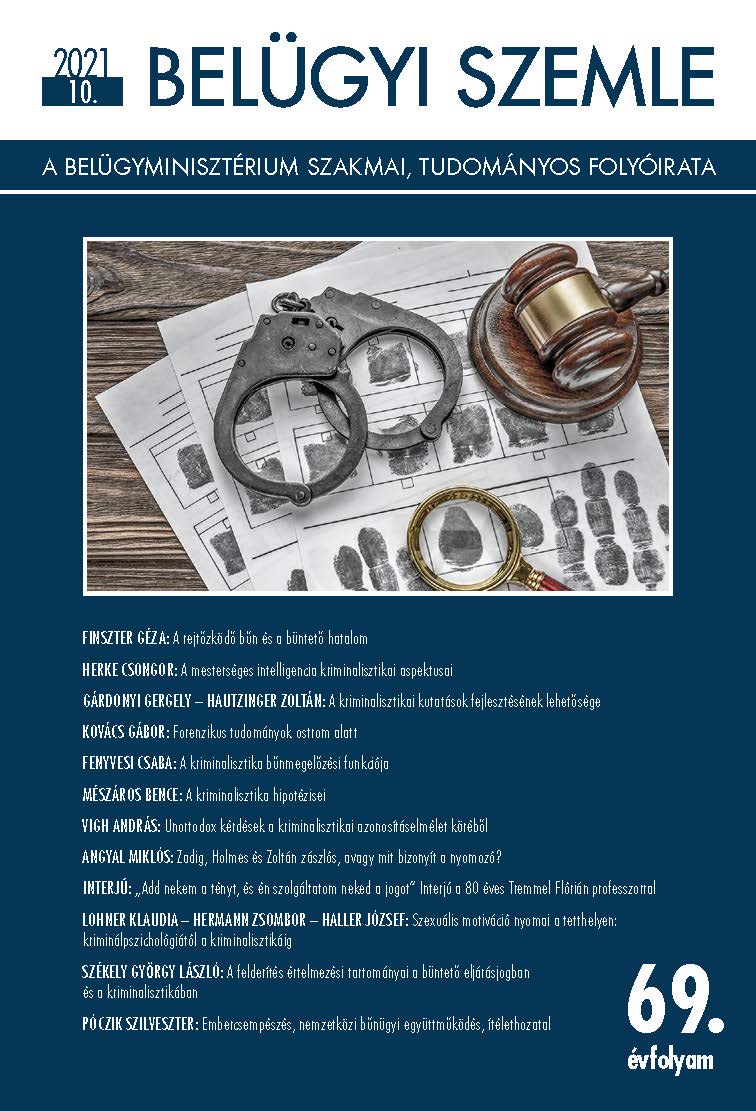Keywords
criminalistics
learning the past
criminal procedure
learning the past
criminal procedure
How to Cite
Hiding crime and punishing power. (2021). Academic Journal of Internal Affairs, 69(10), 1691-1707. https://doi.org/10.38146/BSZ.2021.10.1
Abstract
Learning the past will acquire a procedural significance when some real event of the past would trigger legal consequences. In addition to criminal cases this can be realized in civil litigation, in administrative procedures of the public power, but examples can also be taken from the field of labour law. As criminalistics represent the science of reconstructing a past event, an extension of it to all legal fields can be reasoned. However, such a turn does not have taken place, the discipline of investigation remained within the sphere of criminal sciences. The article examines the causes of that.
Downloads
Download data is not yet available.
Similar Articles
- Sándor Fórizs, János Sallai: A trace of a bygone era. The History of the Iron Curtain , Academic Journal of Internal Affairs: Vol. 61 No. 5 (2013)
- Andrea Szabó, Szabolcs Mátyás, The Chinese solution in the education of law enforcement officers , Academic Journal of Internal Affairs: Vol. 68 No. 3 (2020)
- Péter Hack, Prospects for reforming criminal procedure , Academic Journal of Internal Affairs: Vol. 66 No. 3 (2018)
- Dávid Petrétei, About knowledge theoretical access of evidences , Academic Journal of Internal Affairs: Vol. 66 No. 4 (2018)
- Csaba Fenyvesi, Presentation for recognition and faith , Academic Journal of Internal Affairs: Vol. 66 No. 4 (2018)
- József Hesz, From the bell to the computer - History of fire call and fire alarm , Academic Journal of Internal Affairs: Vol. 68 No. 8 (2020)
- Zoltán Csizner, The case law of the European Court of Human Rights on the use of covert methods , Academic Journal of Internal Affairs: Vol. 69 No. 4 (2021)
- Veronika Bolla, Kristóf András Jáger, Interconnections of aliens policing and criminal procedures, practical problems , Academic Journal of Internal Affairs: Vol. 68 No. 9 (2020)
- Zsuzsanna Borbély, Péter Cieleszky, Zoltán Csizner, Gábor Éberhardt, Tünde Pesti, Laura Schmidt, Zita Veprik, Fanni Vizvári, International Law Enforcement Observer I. , Academic Journal of Internal Affairs: Vol. 69 No. 2 (2021)
- Dávid Petrétei, Theoretical Issues of Forensic Identification , Academic Journal of Internal Affairs: Vol. 68 No. 2 (2020)
You may also start an advanced similarity search for this article.
Most read articles by the same author(s)
- Géza Finszter, Legal basis for the use of covert means , Academic Journal of Internal Affairs: Vol. 72 No. 6 (2024)
- Géza Finszter, Legal basis for the use of covert means , Academic Journal of Internal Affairs: Vol. 72 No. 6 (2024)
- Géza Finszter, Complementary policing , Academic Journal of Internal Affairs: Vol. 71 No. 1 (2023)
- Géza Finszter, The place and perspectives of administrative and law enforcement research , Academic Journal of Internal Affairs: Vol. 70 No. 11 (2022)
- Géza Finszter, Tibor Ibolya: Studies in the history of criminology , Academic Journal of Internal Affairs: Vol. 63 No. 10 (2015)
- Géza Finszter, Endre Bócz , Academic Journal of Internal Affairs: Vol. 69 No. 11 (2021)
- Géza Finszter, Tibor Király (1920–2021) , Academic Journal of Internal Affairs: Vol. 70 No. 2 (2022)
- Géza Finszter, László Korinek, Facts are stubborn things … The worse for the facts?! , Academic Journal of Internal Affairs: Vol. 69 No. 4 (2021)
- Géza Finszter, “Today, a mentally prepared team is being formed, which is the initiator and recipient of the scientific approach… " , Academic Journal of Internal Affairs: Vol. 63 No. 5 (2015)
- Géza Finszter, László Korinek, István Szikinger is 70 years old , Academic Journal of Internal Affairs: Vol. 70 No. 3 (2022)
